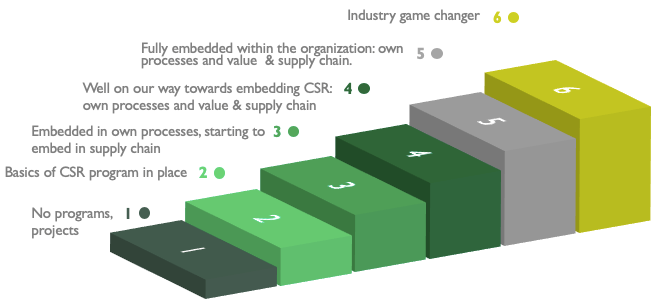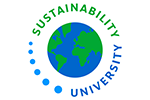For the first edition of the State of the CSR Professional, a survey was conducted amongst Dutch sustainability and CSR professionals in the Netherlands. As more of an exploratory research, 86 sustainability professionals responded to the survey. The results exhibit a general image of the current sustainability workforce landscape.
The State of the CSR Profession: Survey Results 2018
The Professionals
The sample includes all types of sustainability professionals, from starters to Chief Sustainability Officers, and spread over a diverse array of sectors and company types. The majority of the respondents are sustainability managers (46,0%). Only half of the professionals have had a previous job in sustainability or CSR, which could indicate that the profession is growing and attracting professionals with other backgrounds. However, there is room for improvement in educating and training the professionals specifically in CSR and sustainability related topics. The vast majority of the respondents (94.2%) does have received academic education, but solely a quarter has an academic degree in a CSR-related discipline (23,2%). A whopping 25,8% has not obtained any qualifications associated with CSR or sustainability. This implies that the professionals are well educated in general, but not related to CSR. The question remains: are CSR related qualifications a necessity to perform well on the job?
Professionals spend their time on integrated thinking, acting and reporting on average in the ratio of 40%/34%/26%, so the most of their time is spend on integrated thinking. However, if asked how they would preferably divide their time, the ratio between thinking/acting/reporting would be 35%/48%/17%, shifting more towards integrated acting.
CSR Activities
The Organizations
Most professionals work at large companies: large multinational company (25,9%), international company (20,0%) or national company (15.3%). Others work at a medium-sized or small national company (respectively 16,5% and 8,2%), or specified their companies outside of these categories (14,1%), like NGOs. Larger companies probably have more time and resources to actively work on sustainability and CSR, but also have a greater social responsibility. Most companies have their own department and the professionals report directly to the board (47,0%), or sustainability/CSR is allocated to the strategy department (31,8%). In general, the employees have close access to their CEO: 42,4% have direct access and 50.0% have 1 or 2 employees between them and their CEO.
There seems to be a slight trend in the years of working experience and the size of the company where professionals work at. The size of the companies where the respondents work at seems to increase with the years of working experience. In other words, the more experienced CSR professionals work at larger companies. Noteworthy, all the respondents with 20+ years of working experience work at large multinationals.
The roles
In the book ‘MVO doe je ZO’ seven different roles for CSR managers are identified and described: The Networker, the Strategist, the Coordinator and Initiator, the Stimulator and Connector, the Mentor, the Innovation, and the Monitor (see descriptions on the website www.csr-professional.com).
The Strategist is deemed as most important for the organizations by CSR professionals, followed by the Stimulator and Connector and the Coordinator and Initiator. The same results are obtained when asked what roles are deemed most important for themselves as individuals. However, the time spent in reality by the respondents diverge. They spend most time in the role of Coordinator and Initiator, second in Stimulator and Connector, and Strategist only comes third. They would prefer to spend the most time as a Strategist.
Mentor and Monitor come in the second to last and last place, respectively, both on importance and preference of spent time. Noticeable is that when asked what roles the professionals would like to develop themselves, expectedly Strategist comes in first place, but surprisingly Innovator comes in second place, while the latter is deemed in the importance and preferred time spent ratings as fifth out of the seven.
Time spent per role (%)
Corporate Social Responsibility in the Organizations
On the ladder from no CSR to being a game changer in the field of CSR, organizations differ greatly. Most organizations feel like they are well on their way to towards fully embedding CSR in processes and the supply chain (27,3%), and 16,7% is already fulling embedding CSR. 7,6% of the respondents would describe themselves as game changers. These numbers are a positive signal for the industry, as most organizations are progressing towards the upper end of the ladder. There is yet no program in place for 7,6% of the organizations, and only a basic program is implemented at 22,7% of the organizations.
Steps of CSR Integration

When analyzing at the type of CSR professional and the level of CSR integration of the organization, it is noticeable that leadership by a Chief Sustainability Officer or CSR director is apparently needed when the level of integration reaches the fourth step of CSR integration. At companies in lower levels of integration, there were barely any Chief Sustainability Officers or CSR directors, but mostly CSR managers.
Another important result of the survey is that there seems to be a positive trend between the years of working experience and the level of the company’s CSR integration. The higher the level of CSR integration in a company, the more experienced employees the company has. However, this trend seems to persevere up and until the CSR is fully embedded within the organization. For game changers, the trend seems to deviate, as mostly professionals with 5-10 years of work experience work at these companies.
